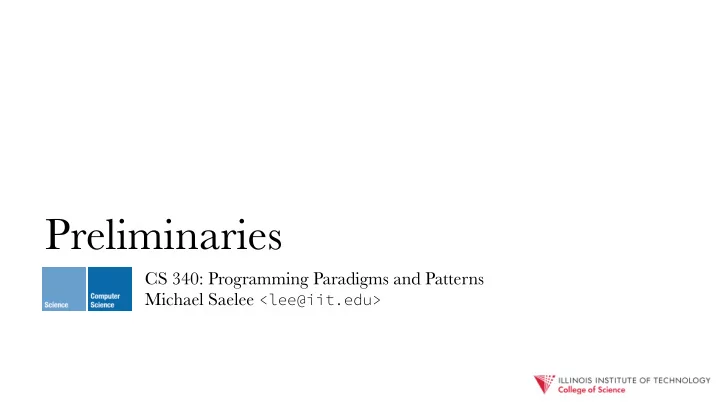

Preliminaries CS 340: Programming Paradigms and Patterns Michael Saelee <lee@iit.edu>
Michael (Sae) Lee - lee@iit.edu - http://moss.cs.iit.edu - Office: SB 226C - Hours: Wed & Fri 3:15PM-5:15PM
TA: Samuel Golden - sgolden2@hawk.iit.edu - Office: SB 108 - Hours: Tue 3:30PM-6:00PM, Thu 4:30PM-6:30PM
Agenda - What is “PPP”? - Why Haskell? - Why take CS 340? - Administrivia - Websites, References, Grading, etc.
“Programming Paradigms and Patterns”
P aradigm - Model for how a program in a given language is organized, expressed, and/or executed - e.g., procedural, imperative, object-oriented, functional, declarative - We will be focusing on the functional paradigm
Why Functional? - Very different set of operating assumptions from your (likely) first model, imperative programming - No state mutation → referential transparency - Arguably easier to reason about (rigorously) and use for concurrency - You’ll read a paper on this for Friday!
P attern - A reusable template for solving a common class of problem(s) - May be paradigm/language specific, and typically as abstract as possible to encourage reuse
E.g., Imperative & OOP patterns - Loops/Iterators for array, list, or collection traversal - Encapsulation with setter/getter methods - Singleton & Factory patterns - Observer pattern, aka Publish/Subscribe
Our focus: Functional patterns - Structural and Generative recursion - Functors and Monads - Monoids and Foldables - Monadic parsing - Etc.
Haskell - Our functional language of choice: Haskell - Pure : purely functional; side-effects are contained/earmarked - Statically typed : types are checked at compile time - Lazy : expressions aren’t evaluated until absolutely necessary - Likely very different from another language you’ve used!
Why Haskell? - It’s fun, surprising, and powerful! - Learning a (different) new language gives you an entirely new way to think about and tackle problems - Valuable, even if you don’t actually code the solution up in said language
A Taste of Haskell fibs = 0 : 1 : zipWith (+) fibs (tail fibs) primes = filterPrime [2..] where filterPrime (p:xs) = p : filterPrime [x | x <- xs, x `mod` p /= 0] quicksort :: Ord a => [a] -> [a] quicksort [] = [] quicksort (p:xs) = (quicksort lesser) ++ [p] ++ (quicksort greater) where lesser = filter (< p) xs greater = filter (>= p) xs
Why take CS 340? - You love to program - You love programming languages - You are frustrated with languages you currently know - You want to learn new ways to reason about programming - This will help in later classes and your career
Topics (not exhaustive) - Functional programming - Haskell Types and Typeclasses (like OOP on steroids) - Higher Order Functions - Functors and Monads - Automated Property-Based Testing - Concurrency and Software Transactional Memory
§ Administrivia
Prerequisites - I assume you are … - fluent in some programming language - familiar with procedural & OO paradigms - comfortable with development processes: - compilation, debugging, testing
Online resources 1. Course website: moss.cs.iit.edu/cs340 - static information - lecture calendar, readings, assignment write-ups, links, etc.
Online resources 2. Blackboard - only for grade reporting !
Online resources 3. Piazza: discussion forum - all class-related questions - monitored by TA - scales way better than e-mail
Online resources 4. Bitbucket: Git repository hosting - you will share a private repository with the TA and me (invitations coming soon) - lecture notes will be distributed via Git - machine problems will be submitted via Git
References - Miran Lipova č a, Learn You a Haskell for Great Good! - Graham Hutton, Programming in Haskell - O’Sullivan, Stewart, Goerzen, Real World Haskell
Grading - 50% Machine Problems - 5-7 Haskell programming assignments - 25% Midterm Exam - 25% Final Exam (Cumulative)
For Friday - Read Hughes’s “Why Functional Programming Matters” (at least sections 1 & 2, if you can get further, great!) - Start reading “Learn You a Haskell” - Clone the repo: https://bitbucket.org/michaelee/cs340.git - Install the Haskell Platform (ideally, using Haskell Stack, haskellstack.org) & bring laptop to class
Recommend
More recommend